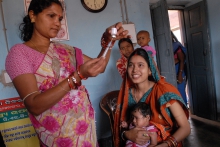Indian health workers demand safe working conditions

The union demands that adequate compensation be given to her family and protests the poor implementation of existing safeguards against deadly TB to nurses and other employees in contact with TB patients.
Unfortunately, this is it not an isolated incident. Since 2011, 12 hospital employees have died due to the infectious disease. According to reports, since 1999, close to 190 employees have been infected with TB, of which 83 have died. A letter from civil society earlier this year pointed to the unsatisfactory infection practices in the hospital that have led to workers acquiring drug-resistant TB. The letter highlights the shortage of personal protective equipment, such as N-95 respirators. “The state and central government is legally bound to protect healthcare workers in government institutions from exposure to communicable and life-threatening diseases, failure of which is a violation of the right to life and health of healthcare workers,” stress the signatory organisations. MMKM is demanding fair and adequate compensation for the family of the deceased for two reasons: she died of a disease acquired in the course of her employment, and she acquired it as a result of criminal negligence on the part of the administration.
The situation is worse for the Class-4 workers (cleaners and ward workers) who are extremely vulnerable and occupationally exposed to TB while tending to patients directly or while cleaning the premises. Yet they have the least access to respirators and are largely employed on a contractual basis, without employment security or basic benefits.
While the management of the hospital is not willing to acquire the necessary safety equipment, a large portion of the health budget of the Brihanmumbai Municipal Corporation (BMC) is under-utilised. Close to 25% of the budget allocated for health in 2013-14 was not used. The BMC (also known as MCGM) is the civic body that governs the capital city of Mumbai in Maharashtra and is India's richest municipal organization. In a letter of support to the struggle of MMKM, V Lakshmi, Public Services International Asia and Pacific Regional Secretary, states that PSI demands from the management of the hospital that adequate preventive systems be put in place to protect workers, and demands from the BMC that adequate policy and budgetary support be provided to public hospitals under its administration. The letter concludes “PSI supports the MMKM in its struggle for adequate conditions of work for health workers in public facilities. This is the only way that universal access to quality services can be ensured.”
The Sewri hospital is the largest chest and TB hospital in Asia with more than 1,200 beds. India is the highest TB burden country, with the World Health Organisation (WHO) statistics for 2013 giving an estimated incidence figure of 2.1 million cases of TB out of a global incidence of 9 million cases.
More information:
- Hospital staff protest after nurse dies of TB (The Indian Express)
- 15 lakh payout sought for nurse who died of TB (The Times of India)

